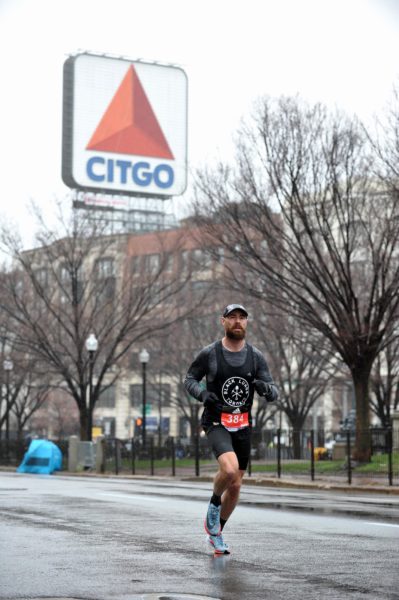Day & Ross execs run the Boston Marathon
It’s a run-derful life for Doug Tingley and Joel Clarke-Ames

HARTLAND, N.B. – Most drivers wouldn’t call the trip from New Brunswick to Boston extensive, but for runners getting there it can be a long haul.
The world’s oldest annual marathon played host this year to two executives from Day & Ross – president Day & Ross Freight, Doug Tingley, and director of operations Day & Ross supply chain and trade networks, Joel Clarke-Ames.
Tingley said he never set out to run the notoriously hard to qualify for race when he started jogging 10 years ago. It wasn’t until a friend suggested he try running a marathon in 2016 that he challenged himself to be a Boston qualifier.
For Clarke-Ames, meanwhile, this was his second time at the late-April event.
“Like a lot of people, I was inspired by the race, the athletes that run it, and I liked the idea that it was something you have to earn,” he said.
In order to qualify for the race competitors must run another approved marathon under a designated time for their age category and gender. Male runners aged 45-49, for example, must complete a qualifying marathon in under three hours and 25 minutes, but that alone isn’t enough. There are only so many spots available, so once runners submit their applications they are approved in order of qualifying time. If spots fill up in a particular age category, even runners with a valid qualifying time may not be approved.
Both athletes say they find racing as a goal gets them on the road when they might want to stay in bed otherwise. Year-round runners Tingley typically logs 70 kilometers per week, while Clarke-Ames can put in up to 160 kilometers in a week.
Both executives say running a race is a lot like running a business.
For Tingley setting goals and understanding the activities he needs to do to achieve them is much like running a fleet.
“As are having faith in your process, monitoring feedback, paying attention to the external environment, continually making small adjustments as you go and being patient that your commitment and consistency,” he said.

Clarke-Ames agrees that faith is most important in running and business when it seems like things aren’t going right – and worth it in the end.
“Often times, in the later stages of a race, things can feel very difficult, which also happens in business. It’s important to stay the course and trust that your plans are well thought out and will guide you to the results you are looking for,” he says. “Both in running and in business, you get a great sense of accomplishment when you reach your goals. It’s certainly very rewarding to know that your hard work has paid off and you have successfully crossed the finish line.”
This year’s Boston Marathon was run in the rain, with water pelting the contestants for nearly the whole 42-kilometer course. Despite the bad weather both runners say it was one of the best marathons they’ve done.
“The actual of experience of Boston was fantastic – we had tough conditions and yet the crowd was still out there supporting the race and the runners. I found myself just looking around as I was running soaking in the atmosphere and thinking to myself how neat the whole thing was and how fortunate I was to be a part of it,” says Tingley.
Have your say
This is a moderated forum. Comments will no longer be published unless they are accompanied by a first and last name and a verifiable email address. (Today's Trucking will not publish or share the email address.) Profane language and content deemed to be libelous, racist, or threatening in nature will not be published under any circumstances.